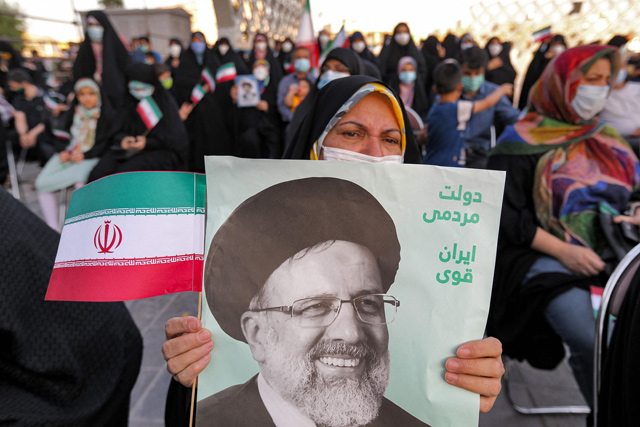TEHRAN — Iran’s ultraconservatives on Sunday hailed the election victory of their candidate Ebrahim Raisi, after Washington charged the vote was unfair and Tehran’s arch-foe Israel labelled him the “most extremist” president yet.
Raisi, 60, won Friday’s election in which more than half the voters stayed away after many political heavyweights had been barred from running and as an economic crisis driven by US sanctions has battered the country.
An austere figure from the Shiite Muslim clerical establishment, Raisi takes over from the moderate incumbent Hassan Rouhani, who must leave office in August after eight years in power.
Raisi, whose black turban signifies direct descent from Islam’s Prophet Mohammad, is seen as close to the 81-year-old supreme leader, Ayatollah Ali Khamenei, who holds ultimate political power in Iran.
“The Dawn of a New Era,” read the jubilant front-page headline of the conservative Resalat daily, welcoming the 62 percent win by Raisi, the head of Iran’s judiciary.
Raisi was congratulated by Russia, Turkey and several Gulf states, and by Iran’s regional allies including Syrian President Bashar Assad, Lebanon’s Hizbollah and Hamas in the Gaza Strip.
Raisi’s victory had been widely anticipated after the Guardian Council, made up of 12 clerics and jurists, had approved just seven candidates, all men, out of a field of almost 600 hopefuls. Three of those vetted candidates dropped out two days before the vote.
Iran’s moderate Jomhouri-e Eslami daily highlighted that conservatives had now cemented their hold on power, from parliament and the Guardian Council to the court system and armed forces.
Using a touch of irony, its editorial said that “we, the people of Iran, owed the conservative faction a homogeneous government” and “the people have delivered”.
‘Epic’ turnout
Turnout reached 48.8 per cent, a record low for a presidential poll since Iran’s 1979 revolution ousted the US-backed monarchy.
The ultraconservative Kayhan daily argued that voter participation was “epic” considering the economic crisis, COVID pandemic and the “enemy’s propaganda”, referring to boycott calls from Iranian opposition groups abroad.
The Resalat daily welcomed the change from the Rouhani administration which it said has been dogged by political infighting and occupied with “fruitless domestic and foreign challenges”.
Rouhani’s landmark achievement was the 2015 deal with world powers under which Iran agreed to limit its nuclear programme in return for sanctions relief.
That deal has however been hanging by a thread since then-US president Donald Trump withdrew from it in 2018 and launched a “maximum pressure” campaign to diplomatically and economically isolate Tehran.
While Iran has always denied seeking a nuclear weapon, Trump charged it was still planning to build the bomb and was destabilising the Middle East through armed proxy groups in Iraq, Lebanon, Syria and Yemen.
Since Trump’s successor Joe Biden took office this year, talks involving Iran and the remaining parties to the accord — Britain, China, France, Germany and Russia — have resumed in Vienna, with the US taking part indirectly.
‘Anti-Western views’
Iran’s ultraconservatives — who deeply distrust the United States, labelled the “Great Satan” in the Islamic republic — bitterly attacked Rouhani over the failing deal and for having trusted the West.
But Raisi has nonetheless said Iran should keep negotiating with the aim of ending the punishing sanctions that have largely cut the country of 83 million off from global markets and financial systems.
The US State Department said after Raisi’s election win that Washington would continue talks over Iran’s nuclear programme, working with its allies and partners.
A spokesperson charged however that “Iranians were denied their right to choose their own leaders in a free and fair electoral process”.
In Israel, which has engaged in a shadow conflict with Iran for years, foreign ministry spokesman Lior Haiat said the Islamic republic had “elected its most extremist president to date”.
Raisi was “committed to Iran’s rapidly advancing military nuclear programme”, Haiat wrote on Twitter. “His election makes clear Iran’s true malign intentions, and should prompt grave concern among the international community.”
Israel’s new Prime Minister Naftali Bennett said that Raisi’s election is “the last chance for the world powers to wake up before returning to the nuclear agreement and to understand who they are doing business with”.
Analysts for think thank the Eurasia Group said Raisi’s election win would likely not derail the ongoing Vienna talks to salvage the nuclear deal.
But they warned that “his hardline, anti-Western views are a sharp break from the more moderate stances of Rouhani and will have a significant impact on Tehran’s relationship with the outside world”.
EU foreign affairs chief Josep Borrell, speaking about the Vienna talks, said: “We are very close... So I hope that the result of the election is not going to be the last obstacle that will ruin the negotiation process.
“As far as I know... this is not going to be the case. It is not a matter of this president or another, it is the understanding of what is at stake.”
